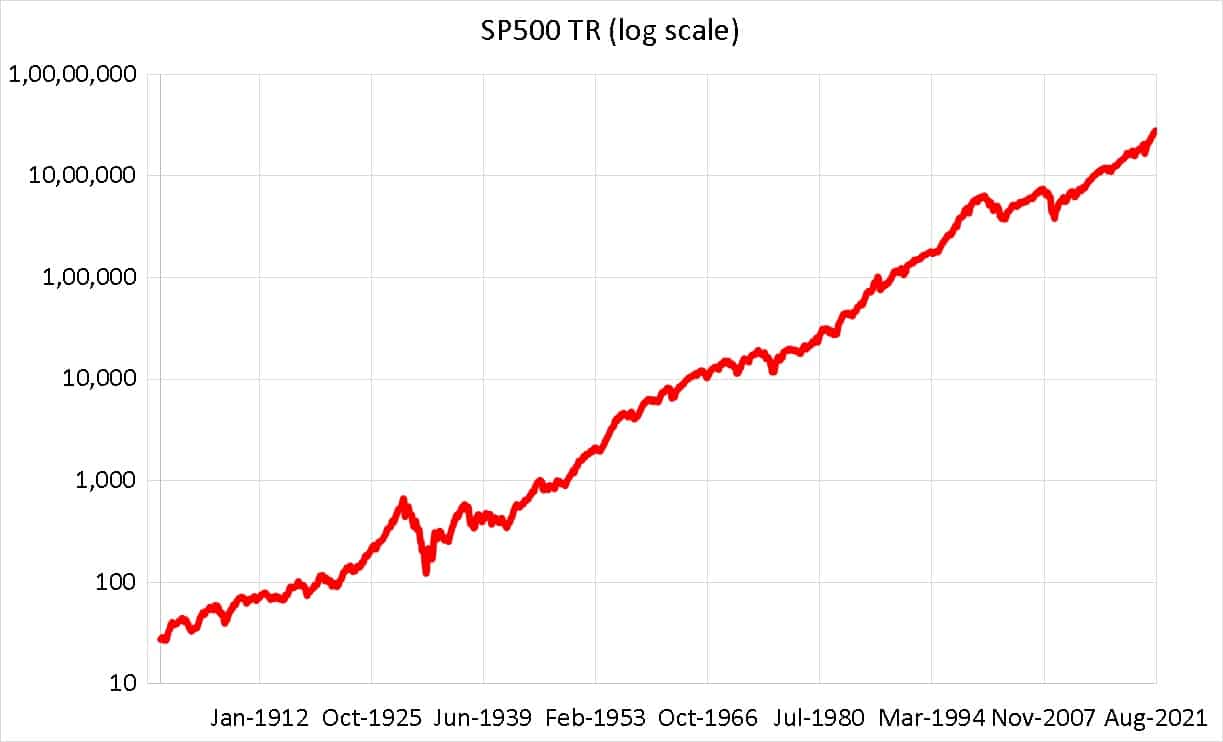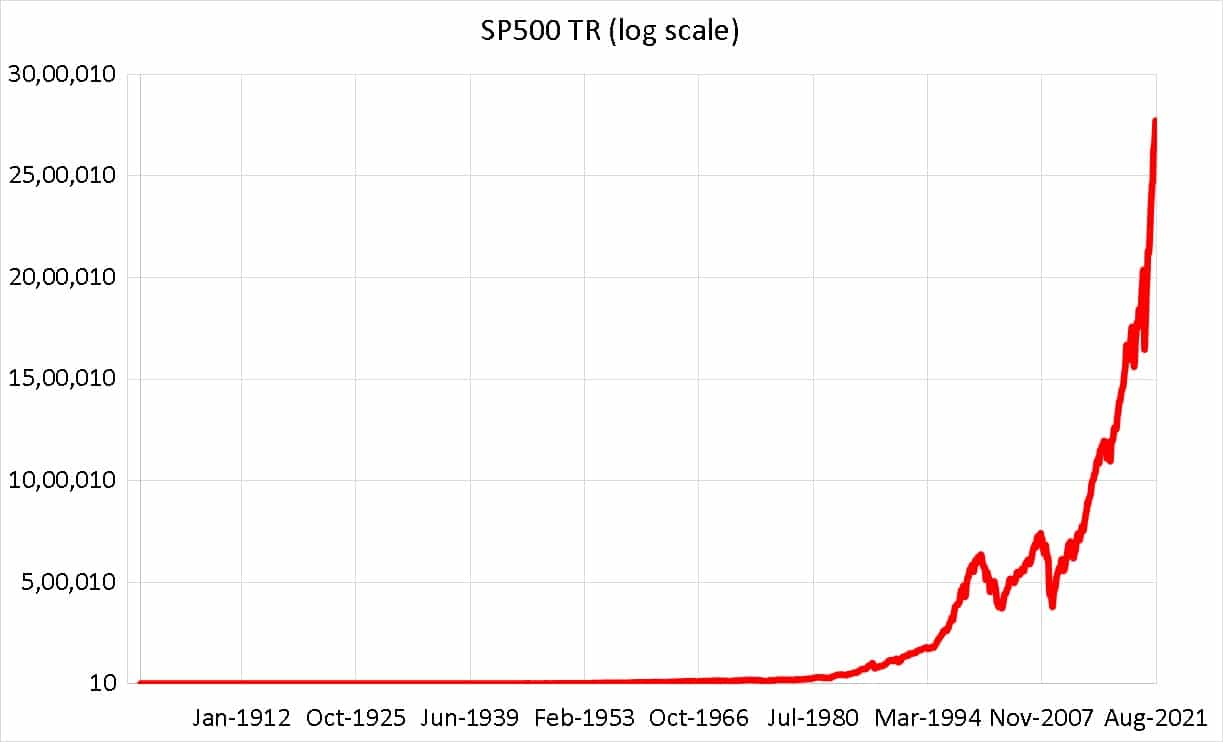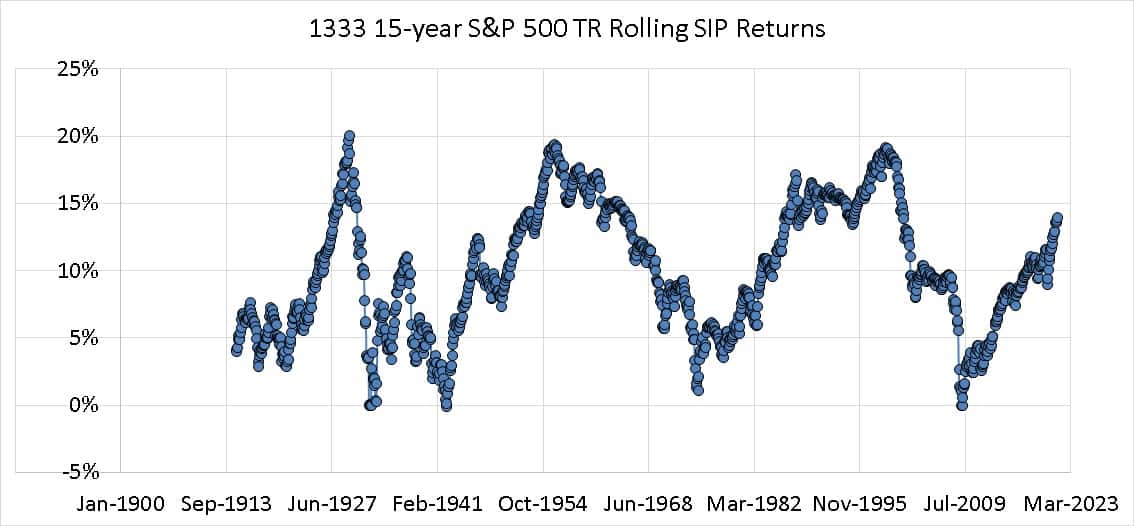Last Updated on January 7, 2024 at 10:19 am
In his new book, Same as Ever, Morgan Housel says, “A good summary of investing history is that stocks pay a fortune in the long run but seek punitive damages when you demand to be paid sooner.”
“Consider a long stretch of history, from 1871 to 2018. During that period, the odds that the US stock market was positive on any given day was about 50%, a coin toss. Over any three-month period, it was a little better, about 60%. Over a one-year period, it was 68%, getting better.”
“Over five-year periods, the stock market has been higher 80% of the time. Over 10-year periods, 88% of the time. And over 20-year periods, 100% of the time. One way to think about this is that there is a most convenient investing time horizon, probably around ten years or more. That’s the period in which markets nearly always reward your patience. The more the time horizon compresses, the more you rely on luck and tend to ruin.”
He then says 90% of investing blunders are due to investors trying to compress this natural time horizon. There is no disagreement here, and most readers will agree that equity is for the long-term.
Join 32,000+ readers and get free money management solutions delivered to your inbox! Subscribe to get posts via email! (Link takes you to our email sign-up form)

🔥Want to create a complete financial plan? Learn goal-based investing? Exclusive access to our DIY tools? Increase your income with your skills? Use this link to enjoy massive discounts on our robo-advisory tool & courses! 🔥
However, the suggestion here is that all long-term investors are bound to be successful. This is far from true. The stock market always moves up in the long term, but returns move up and down!
To better appreciate this, we need sufficient market history. Using the Schiller PE data, we shall turn to the S&P 500 Total Returns index for this. The S&P 500, when plotted on a log scale, again underpins the sentiment that the markets will move up over the long term.

It looks bizarrely extraordinary when plotted normally because it extends beyond the normal human lifespan.

When we look at the 15-year rolling SIP returns data – there are 1279 such data points! – it is nothing short of extraordinary! The true cyclic nature of long-term equity returns is seen.

We only see an arm and leg of this cyclicity in the case of the Sensex because of its short history – meaning we have to be more careful about what to expect from equity in the future.
From the above graph, we can see that the chances that “over the long term” the (US) stock market will beat (US) inflation is high but not 100%. Even more important, the chances of your stock market investment beating your return expectation (which is always higher than inflation) after tax is well below 100%. See: Equity may beat inflation, but that doesn’t mean you will!
Moran Housel appreciates this. Later in the book, he says, “If it is 2010 and I have a 10-year time horizon, your target date is 2020, which is when the world fell to pieces. If you were a business or an investor, it was a terrible time to assume the world was ready to give you the reward you have been patiently awaiting”.
However, the solution he recommends is far from practical. “A long-time horizon with a firm end date can be as reliant on chance as a short-term horizon. Far superior is flexibility. Time is compounding magic. And its importance can be minimized. But the odds of success fall deepest in your favour when you mix a long term horizon with a flexible end date or an indefinite horizon. Benjamin Graham said the purpose of the margin of safety is to render the forecast unnecessary. The more flexibility you have, the less you need to know what happens next”.
One cannot be flexible with (personal) financial goals like retirement and a child’s college fees. Sure, in some cases, retirement can be preponed or postponed, but not always, and one cannot assume this is possible five years or ten years from now.
We must be flexible with our asset allocation, not our end date. Long term investors must have a solid systematic risk management plan by gradually de-risking their equity exposure. Our research – explained in the goal-based portfolio management course and incorporated into the freefincal robo advisor shows that this has more than a reasonable chance of success regardless of market conditions. This is also explained here: do not expect returns from mutual fund SIPs! Do this instead!
Such a gradual and systematic equity de-risking is the margin of safety that will make our chances of success reasonably independent of future market conditions and their forecasts, not a flexible end date. Morgan Housel’s approach to equity investing* over the long term, as outlined in Same as Ever, is, unfortunately, the same as ever – dependent on chance or flexibility. We need a much better plan.
* If memory serves me right, in “The Psychology of Money”, he mentioned that he holds 30% cash “just in case”, – which is commendable from a risk management standpoint. However, very few of his readers would follow suit.

Use our Robo-advisory Tool to create a complete financial plan! ⇐More than 3,000 investors and advisors use this! Use the discount code: robo25 for a 20% discount. Plan your retirement (early, normal, before, and after), as well as non-recurring financial goals (such as child education) and recurring financial goals (like holidays and appliance purchases). The tool would help anyone aged 18 to 80 plan for their retirement, as well as six other non-recurring financial goals and four recurring financial goals, with a detailed cash flow summary.
🔥You can also avail massive discounts on our courses and the freefincal investor circle! 🔥& join our community of 8000+ users!
Track your mutual funds and stock investments with this Google Sheet!
We also publish monthly equity mutual funds, debt and hybrid mutual funds, index funds, and ETF screeners, as well as momentum and low-volatility stock screeners.
You can follow our articles on Google News

We have over 1,000 videos on YouTube!

Join our WhatsApp Channel



- Do you have a comment about the above article? Reach out to us on Twitter: @freefincal or @pattufreefincal
- Have a question? Subscribe to our newsletter using the form below.
- Hit 'reply' to any email from us! We do not offer personalised investment advice. We can write a detailed article without mentioning your name if you have a generic question.
Join 32,000+ readers and get free money management solutions delivered to your inbox! Subscribe to get posts via email! (Link takes you to our email sign-up form)
About The Author
 Dr M. Pattabiraman (PhD) is the founder, managing editor and primary author of freefincal. He is an associate professor at the Indian Institute of Technology, Madras. He has over 13 years of experience publishing news analysis, research and financial product development. Connect with him via Twitter(X), LinkedIn, or YouTube. Pattabiraman has co-authored three print books: (1) You can be rich too with goal-based investing (CNBC TV18) for DIY investors. (2) Gamechanger for young earners. (3) Chinchu Gets a Superpower! for kids. He has also written seven other free e-books on various money management topics. He is a patron and co-founder of “Fee-only India,” an organisation promoting unbiased, commission-free, AUM-independent investment advice.
Dr M. Pattabiraman (PhD) is the founder, managing editor and primary author of freefincal. He is an associate professor at the Indian Institute of Technology, Madras. He has over 13 years of experience publishing news analysis, research and financial product development. Connect with him via Twitter(X), LinkedIn, or YouTube. Pattabiraman has co-authored three print books: (1) You can be rich too with goal-based investing (CNBC TV18) for DIY investors. (2) Gamechanger for young earners. (3) Chinchu Gets a Superpower! for kids. He has also written seven other free e-books on various money management topics. He is a patron and co-founder of “Fee-only India,” an organisation promoting unbiased, commission-free, AUM-independent investment advice.Our flagship course! Learn to manage your portfolio like a pro to achieve your goals regardless of market conditions! ⇐ More than 3,500 investors and advisors are part of our exclusive community! Get clarity on how to plan for your goals and achieve the necessary corpus no matter the market condition!! Watch the first lecture for free! One-time payment! No recurring fees! Life-long access to videos! Reduce fear, uncertainty and doubt while investing! Learn how to plan for your goals before and after retirement with confidence.
Increase your income by getting people to pay for your skills! ⇐ More than 800 salaried employees, entrepreneurs and financial advisors are part of our exclusive community! Learn how to get people to pay for your skills! Whether you are a professional or small business owner seeking more clients through online visibility, or a salaried individual looking for a side income or passive income, we will show you how to achieve this by showcasing your skills and building a community that trusts and pays you. (watch 1st lecture for free). One-time payment! No recurring fees! Life-long access to videos!
Our book for kids: “Chinchu Gets a Superpower!” is now available!


Must-read book even for adults! This is something that every parent should teach their kids right from their young age. The importance of money management and decision making based on their wants and needs. Very nicely written in simple terms. - Arun.Buy the book: Chinchu gets a superpower for your child!
How to profit from content writing: Our new ebook is for those interested in getting a side income via content writing. It is available at a 50% discount for Rs. 500 only!
Do you want to check if the market is overvalued or undervalued? Use our market valuation tool (it will work with any index!), or get the Tactical Buy/Sell timing tool!
We publish monthly mutual fund screeners and momentum, low-volatility stock screeners.
About freefincal & its content policy. Freefincal is a News Media organisation dedicated to providing original analysis, reports, reviews and insights on mutual funds, stocks, investing, retirement and personal finance developments. We do so without conflict of interest and bias. Follow us on Google News. Freefincal serves more than three million readers a year (5 million page views) with articles based only on factual information and detailed analysis by its authors. All statements made will be verified with credible and knowledgeable sources before publication. Freefincal does not publish paid articles, promotions, PR, satire or opinions without data. All opinions will be inferences backed by verifiable, reproducible evidence/data. Contact Information: To get in touch, please use our contact form. (Sponsored posts or paid collaborations will not be entertained.)
Connect with us on social media
- Twitter @freefincal
- Subscribe to our YouTube Videos
- Posts feed via Feedburner.
Our publications
You Can Be Rich Too with Goal-Based Investing
 Published by CNBC TV18, this book is designed to help you ask the right questions and find the correct answers. Additionally, it comes with nine online calculators, allowing you to create custom solutions tailored to your lifestyle. Get it now.
Published by CNBC TV18, this book is designed to help you ask the right questions and find the correct answers. Additionally, it comes with nine online calculators, allowing you to create custom solutions tailored to your lifestyle. Get it now.Gamechanger: Forget Startups, Join Corporate & Still Live the Rich Life You Want
 This book is designed for young earners to get their basics right from the start! It will also help you travel to exotic places at a low cost! Get it or gift it to a young earner.
This book is designed for young earners to get their basics right from the start! It will also help you travel to exotic places at a low cost! Get it or gift it to a young earner.Your Ultimate Guide to Travel
 This is an in-depth exploration of vacation planning, including finding affordable flights, budget accommodations, and practical travel tips. It also examines the benefits of travelling slowly, both financially and psychologically, with links to relevant web pages and guidance at every step. Get the PDF for Rs 300 (instant download)
This is an in-depth exploration of vacation planning, including finding affordable flights, budget accommodations, and practical travel tips. It also examines the benefits of travelling slowly, both financially and psychologically, with links to relevant web pages and guidance at every step. Get the PDF for Rs 300 (instant download)